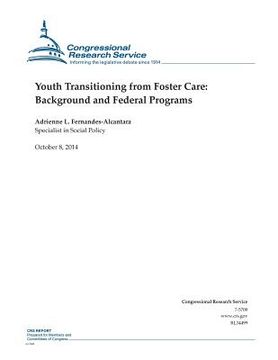Youth Transitioning from Foster Care: Background and Federal Programs (en Inglés)
Reseña del libro "Youth Transitioning from Foster Care: Background and Federal Programs (en Inglés)"
While most young people have access to emotional and financial support systems throughout their early adult years, older youth in foster care and those who are emancipated from care often face obstacles to developing independent living skills and building supports that ease the transition to adulthood. Older foster youth who return to their parents or guardians may continue to experience poor family dynamics or a lack of emotional and financial supports, and studies have shown that recently emancipated foster youth fare poorly relative to their counterparts in the general population on several outcome measures. The federal government recognizes that older youth in foster care and those aging out are vulnerable to negative outcomes and may ultimately return to the care of the state as adults, either through the public welfare, criminal justice, or other systems. Under the federal foster care program, states may seek reimbursement for youth to remain in care up to the age of 21. In addition, the federal foster care program has certain protections for older youth. For example, states must annually obtain the credit report of each child in care who is age 16 or older (age 14 and older as of late 2015). States must also assist youth with developing what is known as a transition plan. The law requires that a youth's caseworker, and as appropriate, other representative(s) of the youth, assist and support him or her in developing the plan. The plan is to be directed by the youth, and is to include specific options on housing, health insurance, education, local opportunities for mentors, workforce supports, and employment services. Other protections will go into effect in late 2015 that will require states to ensure that youth age 14 and older are consulted about the development and revisions to their case plan and permanency plan, and that the case plan includes a document listing certain rights for these youth. Separately, the federal government provides funding for services to assist in the transition to adulthood through the John H. Chafee Foster Care Independence Program (CFCIP). The law enables states to provide these services to youth who are likely to age out of foster care (with no lower age limit), and youth age 16 or older who left foster care for kinship guardianship or adoption. Independent living services may include assistance in obtaining a high school diploma, career exploration, training in daily living skills, training in budgeting and financial management skills, and preventive health activities, among other services. The CFCIP requires that states ensure youth in independent living programs participate directly in designing their own program activities that prepare them for independent living, and further that they "accept personal responsibility for living up to their part of the program." The Chafee Education and Training Voucher (ETV) program separately authorizes discretionary funding for education and training vouchers for eligible youth to cover their cost of postsecondary education (until age 23). A recent evaluation of independent living programs, such as those that provide mentoring and life skills, shows mixed results. One promising independent living program has social workers who oversee a small caseload and have regular, ongoing interactions with the youth. The youth in this program are more likely to attend college and stay enrolled than their peers not in the program. Along with the CFCIP, other federal programs are intended to help current and former youth in foster care make the transition to adulthood. Federal law authorizes funding for states and local jurisdictions to provide workforce support and housing to older foster youth and youth emancipating from care. Further, the law that established the CFCIP created an optional Medicaid eligibility pathway for youth who age out of foster care; this pathway is often called the "Chafee option.

